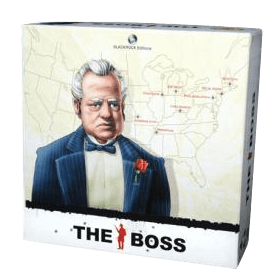The Boss
 The Boss คือเกมที่ออกแบบโดย Alain Ollier และเผยแพร่โดย Blackrock Editions
The Boss คือเกมที่ออกแบบโดย Alain Ollier และเผยแพร่โดย Blackrock Editions
จำนวนผู้เล่น: 2 - 5
ระยะเวลาของเกม: 27 mn
ความซับซ้อน: 2 / 5
เล่น The Boss และ 1229 เกมอื่นๆ ออนไลน์
ไม่จำเป็นต้องดาวน์โหลด - เล่นได้โดยตรงจากเว็บเบราว์เซอร์ของคุณ
กับเพื่อนและผู้เล่นนับพันจากทั่วโลก
ฟรี.

เล่น The Boss และ 1229 เกมอื่นๆ ออนไลน์
ไม่จำเป็นต้องดาวน์โหลด - เล่นได้โดยตรงจากเว็บเบราว์เซอร์ของคุณ
กับเพื่อนและผู้เล่นนับพันจากทั่วโลก
ฟรี.

กฎย่อ
The Boss is a game of logical deduction and bluffing, set as a large gangster group on the cities of USA.
Objective
Be the player with the most money at the end of the game.
Mechanics
Several character cards are dealt at the beginning of the game and will not change during the game. The characters used depend on the number of players.
The character card shows several symbols, indicating the list of city cards associated with it. For example, the character (on) Detroit (colored blue) has five city cards: four showing various number of money bags (1, 2, 3, 4), and one gun. The only exception is Chicago (red), which has no city cards associated with it.
At the beginning of a hand, one associated city card is dealt face down under each character card (except Chicago), and the remaining city cards are distributed evenly to the players (5 for 2-4 players and 4 for 5-6 players). At the end of the hand, the city card below each character card is the reward for each character, claimed by the player with the majority on the character card. Hence, the city cards held by each player gives them information on what city card can be the reward, by ruling out some possibilities.
Each player has 9 gangsters, divided into 6 Experts (permanent gangsters, can be reused), and 3 Occasionals (temporary gangsters, can only be used once). These are the gangsters that fight for majority for each character.
One hand
Beginning of hand
At the beginning of a hand, each character card has one face down city card, as described above. At the beginning of the game, the Chicago card is located on the second position, while the remaining cards are ordered according to their numbers. Later, after each hand, the Chicago card moves right; see below.
One player holds the starting player marker, which begins the hand. After a player plays, the turn passes over clockwise.
The player currently playing will perform two phases:
Phase 1: Placing gangsters
The player may play some of their gangsters to a single character card, deploying their gangsters there. There are a few rules:
- After playing their gangsters, the player must have the most gangsters on the character card. Experts and occasionals are counted equally. For example, if player Red has 2 gangsters on New York and player Green has 4 gangsters on it, Red must play at least 3 more gangsters on New York to gain majority (5 vs 4) or decide to play somewhere else.
- An occasional must be accompanied by an expert on the character card, either played earlier or played together, although a single expert suffices to accompany all three occasionals.
- A player may not play on Chicago before playing somewhere else.
Phase 2: Revealing a city card
The player must play a city card, putting it next to the corresponding character card, thus revealing information about that city (of which option cannot be the face down card).
Last two turns of the hand
When the starting player (the one with the marker) wants to play and they have only two cards on their hand, they reveal one police card. Police cards determine the end of the game, and are explained in more details below.
Last turn of the hand
When the fourth turn of each player ends (all players have one card left), the order of play is changed. Now the player with the most gangsters (experts and occasionals) plays first, in decreasing order of number of gangsters, until the player with the least gangsters plays last. In case of a tie, the same order (starting from the player with the marker and going clockwise) is used for those players.
End of hand
After all cards are played, the hand ends. Each face down city card is revealed, and the player with the most gangsters played on the city gains the "reward". There are several kinds of city cards:
- Money bag with a number: A money bag is worth one million dollars, the unit of the game. Win the shown amount of money.
- Theft: Lose two million dollars.
- 4 Shoot-Out: Win four million dollars. Additionally, for each player having a gangster on the city that is not the winner, kill one of their experts.
- Banished: The "winner" may no longer play gangsters here for the rest of the game.
- Hospital: The "winner" loses one expert due to injury, which must be put to the hospital for the next hand. After that, the expert is retrieved back.
- Prison: The "winner" loses one expert due to being caught, which must be put to the prison for the next two hands. After that, the expert is retrieved back.
- Revolver: The "winner" loses one expert, killed by a gun. The expert is removed from the rest of the game.
Chicago is scored differently. The winner on Chicago first computes the number of money bags last played for the cities to the left of it, and gains that many money bags, divided by two, rounded down. For example, suppose the Chicago is after Boston (yellow), with New York (black) and Boston to the left of it. Also suppose that after the hand, the 3 million card is played last on New York and the prison card is played last on Boston. Then the winner on Chicago wins the number of money bags to the left, 3 (New York) plus 0 (Boston), divided by two, which means 3/2 = 1 million.
Preparation for next hand
After each hand, if it's not the end of game yet, move the starting player marker clockwise and move the Chicago card one step to the right (swapping with the card to its right).
End of game
Each hand, after the third turn of each player, a police card is revealed. There are five police cards. Two have silver badges, two have gold badges, and one has both badges. When three badges of the same color are revealed, it signals the end of the game; after the current hand finishes, the game ends.
The winner is the player with the most money bags.

